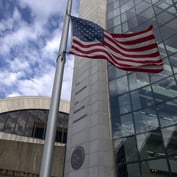May 5, 2005 — A challenge to the Securities and Exchange Commission’s new mutual fund regulations was heard in appeals court in Washington DC on April 15. Passed in a 3-2 vote by the SEC in June 2004, the new rules mandate that most fund boards comprise an independent chairman, as well as 75% independent directors, by Jan. 16, 2006.
As the controversy surrounding the rules has worked its way through the press to the investing public’s mind, and now the courts, many view it as essentially boiling down to an argument between two camps: those who think the fund investor should come first, and those who think the fund advisor, as the investor’s steward, should.
If the rules are upheld, some 80% of mutual fund boards will need to find a new chair. Indeed, many funds are beginning to consider naming independent chairmen, while others already have. The court’s decision on the rules is expected by in the summer. In the meantime, the industry itself appears far from settled on the issue.
Public response to the rules has been emphatic on both sides. Prior to voting, the SEC received nearly 200 comment letters from individual brokers and investors, major fund families, industry pundits, members of Congress, and former SEC chairs. The SEC wrote in its ruling that most commenters supported strengthening fund governance, but many were divided over the proposals, with some believing they went too far, and others not far enough.
Suit Questions SEC Authority
The current suit was filed by the U.S. Chamber of Commerce in September. It contends that the SEC lacks statutory authority to mandate board composition, and that the rules are arbitrary and capricious.
“We have been concerned with a number of actions taken by the SEC…that we think go beyond what is necessary to protect the investing public,” said Stephen Bokat, general counsel and head of the Chamber’s legal arm. “If there are excessive costs involved in complying with regulations, it’s going to come out of the proceeds that ultimately benefit the public.”
The rules modify ten existing exemptions in the 1940 Investment Company Act. The Act prohibits certain activities posing serious conflict-of-interest risk, such as securities transactions between a mutual fund and another client of its adviser. However, it created the exemptions so that funds engaged in such activities would be subject to conditions, set by the Commission, to guard against self-dealing. In 1940, the SEC required funds applying for exemption to have 40% independent board members. In 2001, it raised that requirement to 50%. Funds that do not apply for any of the ten exemptions are not bound by these conditions.
In 2004, following the mutual fund investigations led by New York State Attorney General Eliot Spitzer, the SEC determined that figure to be an insufficient safeguard and raised the ratio of independent board members, including the chair, to 75%. “A principal purpose of the [original amendments] is to strengthen the independent directors’ control of the fund board and its agenda, so that the interests of investors are paramount,” the Commission wrote in its ruling. That is, the new rules were intended to tip the scales in investors’ favor.
Representatives from the SEC’s legal team declined to comment on the record, citing pending litigation. But in March, SEC chair William H. Donaldson told the Committee on Senate Banking, Housing, and Urban Affairs that the fund governance initiatives was “a centerpiece of the Commission’s reform agenda.”
Pros & Cons of Board Membership Mandate
Many familiar arguments both for and against the rules are encompassed by the legal briefs in the case. The Chamber’s “arbitrary and capricious” charge contends, for example, that the SEC has failed to show how misbehavior in the past, such as market timing and late trading, was due to funds being headed by boards with less than a supermajority of independent members — and how the new rules would prevent it in the future.
In its brief, the SEC responds that the “scandals…reflected a serious breakdown in controls over the conflicts of interest between funds and their managers that are inherent in the external management structure of funds…” The agency determined that it was “reasonable” to conclude that existing oversight was not sufficient and needed to be improved. The Chamber’s brief counters that, if the last time the SEC raised the independent mandate it hadn’t had the desired effect, what was the guarantee that this would do the trick?
The Chamber also charges that the SEC failed to examine relevant data. Both sides acknowledge that empirical data are scarce. The sole study submitted to the SEC, the Bobroff-Mack report, was commissioned by Fidelity Investments. Chairman and CEO ‘Ned’ Johnson III, who also chairs Fidelity’s funds, is an ardent opponent of the rules. The study concludes that funds with independent board chairs have performed less well than those with management chairs, and have higher expenses.
In their dissent published with the rulings — a rare public display of conflict — SEC commissioners Cynthia Glassman and Paul Atkins similarly fault the Commission for failing to consider the “empirical data that could have been analyzed to evaluate potential benefits.” As discussed in some detail in the ruling’s footnotes, the SEC majority had dismissed the Bobroff report because, as its authors acknowledge, fund performance may be affected by more factors than board composition, and due to opposing interpretations of the same data. In its brief, the SEC calls the report’s claim that independently chaired firms have lower returns “pure conjecture.”
Another critic of the study is John Bogle, founder of the Vanguard Funds and an ardent proponent of the independent chair rules. In a published speech to the SEC last year, Bogle stated that the study’s data are misleading, that funds are miscategorized, and that the individuals counted as independent were not truly so. Using the same data, Bogle concludes that management-chaired funds ranked at the bottom in terms of performance, independently chaired funds did slightly better, and mutualized, internally operated funds (like Vanguard) provided “distinctly superior performance.”
David Ruder, chairman of the Mutual Fund Directors Forum, regards the Bobroff report as irrelevant. “They were concentrating on whether an independent chairman would make the fund more efficient,” he said. “The question is whether an independent chairman will help the fund avoid conflicts of interest.” Ruder is one of seven living former SEC chairmen who submitted a joint letter supporting the independent board member rules.








 May 11, 2005 at 08:00 PM
May 11, 2005 at 08:00 PM










